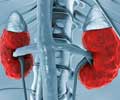Several recent studies have suggested that common gene variations may be responsible for much of the elevated risk of kidney disease in African Americans.
Several recent studies have suggested that common gene variations may be responsible for much of the elevated risk of kidney disease in African Americans.
New research on the MYH9 gene and its implications for the screening and possible prevention of kidney disease in the African American population will be summarized in a press briefing to be held at the American Society of Nephrology's 41st Annual Meeting and Scientific Exposition in Philadelphia, PA."The susceptible variants in the gene MYH9 are very frequent among African Americans and account for a substantial proportion of the higher risk of end-stage renal disease (ESRD) in African Americans compared to European Americans," comments Rulan S. Parekh, MD, of Johns Hopkins University School of Medicine in Baltimore, MD, who will introduce the press briefing. "Discovery of this gene has opened up a new area of research to focus on both the mechanism of disease and also potential use for screening in the population."
In September, researchers from the National Institutes of Health (NIH) in Bethesda, MD, and Johns Hopkins University published independent studies showing that variations of the (non-muscle myosin heavy chain 9) gene (MYH9) are linked to certain types of kidney disease that are more common in African Americans, including focal segmental glomerulosclerosis (FSGS), HIV-associated nephropathy, and non-diabetic ESRD.
Variations of MYH9 may also explain the increased rate of hypertension-related kidney disease in African Americans, which tends to persist even with effective treatment to lower blood pressure. Overall, the gene variants appear to increase the risk of developing any form of ESRD, which is irreversible kidney failure requiring dialysis or transplantation not related to diabetes.
The discoveries have major public health implications because of the high frequency of MYH9 variants among African Americans with kidney disease: up to 60 percent, compared with four percent of European Americans.
At the press briefing, Dr. Parekh will introduce a panel of researchers at the forefront of ongoing research on MYH9. The speakers will share their perspectives on the discoveries so far, key areas for further study, and the implications for risk screening and efforts to reduce kidney disease in the African-American population.
LIN
 MEDINDIA
MEDINDIA




 Email
Email










